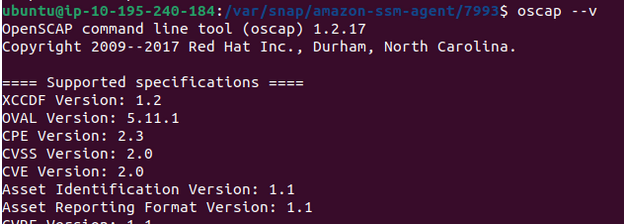Title
Create new category
Edit page index title
Edit category
Edit link
CIS OS Hardening Guidelines
MetaDefender Aether is compatible with installations on operating systems hardened to CIS Level 1 or Level 2 standards: https://www.cisecurity.org/cis-benchmarks
Please note that CIS Level 1 or Level 2 hardening is not yet available on Ubuntu 24.04
Here you can find a more user-friendly description of the relevant changes applied during hardening:
This documentation provides some example instructions to harden an Ubuntu 22.04 operating system.
Hardening steps
OpenSCAP will be utilized for the hardening process. For more details about the tool, please refer to the official OpenSCAP website: https://www.open-scap.org
Install the OpenSCAP tool on your system.
sudo apt install libopenscap8 -yAdditionally, download the relevant security guides, which contain practical hardening advice and links to compliance requirements in order to ease deployment activities such as certification and accreditation.
You can find the installation step on the OpenSCAP website. https://www.open-scap.org/security-policies/scap-security-guide/#install
apt install ssg-base ssg-debderived ssg-debian ssg-nondebian ssg-applicationsThe installation may fail because the ssg packages are currently unavailable in the Ubuntu 22.04 repositories.
In this case, the relevant ssg can be manually downloaded from the ComplianceAsCode repository.
https://github.com/ComplianceAsCode/content/releases/tag/v0.1.74
Example script to download the pre-built security guide and transfer the relevant files to the OSCAP target location
wget https://github.com/ComplianceAsCode/content/releases/download/v0.1.74/scap-security-guide-0.1.74.zipunzip scap-security-guide-0.1.74.ziprm scap-security-guide-0.1.74.zipmkdir -p /usr/share/xml/scap/ssg/content/cp scap-security-guide-0.1.74/ssg-ubuntu2204* /usr/share/xml/scap/ssg/content/Verify the installation by running the following command:
sudo oscap --vAs a result, you should see an output similar to the following:

Run an evaluation on the system to generate a baseline report, which will be used to create the remediation script. Make sure to save the report so you can compare the results after the hardening process.
Use the following command to run the evaluation and save the results in both XML and HTML formats:
sudo oscap xccdf eval --results result.xml --report report.html --profile xccdf_org.ssgproject.content_profile_cis_level2_server /usr/share/xml/scap/ssg/content/ssg-ubuntu2204-ds.xmlGenerate the remediation script based on the report.xml file:
sudo oscap xccdf generate fix --fix-type bash --output my-remediation-script.sh --result-id xccdf_org.open-scap_testresult_xccdf_org.ssgproject.content_profile_cis_level2_server result.xmlExecute the remediation script:
sudo chmod o+x my-remediation-script.shsudo ./my-remediation-script.shThe script will address many issues. However, please note that some findings may still require manual intervention.
Review hardening results
To review the changes implemented by the remediation script, run the evaluation again. Make sure to use different file names for the XML and HTML reports to facilitate comparison of the results.
sudo oscap xccdf eval --results result-post.xml --report report-post.html --profile xccdf_org.ssgproject.content_profile_cis_level2_server /usr/share/xml/scap/ssg/content/ssg-ubuntu2204-ds.xmlWhen comparing the results, you should observe that cases where a rule evaluation previously resulted in a failure are now marked as passed.
See the "Technical Datasheet" for a complete list of features: https://docs.opswat.com/filescan/datasheet/technical-datasheet

